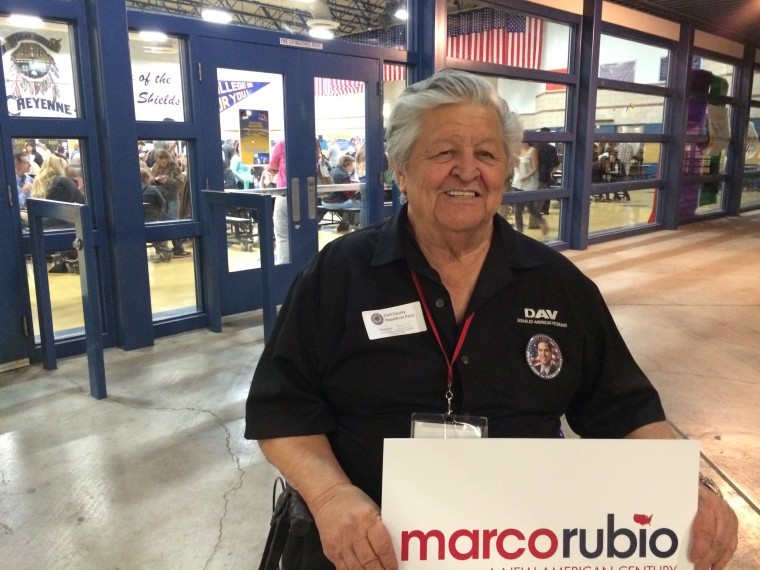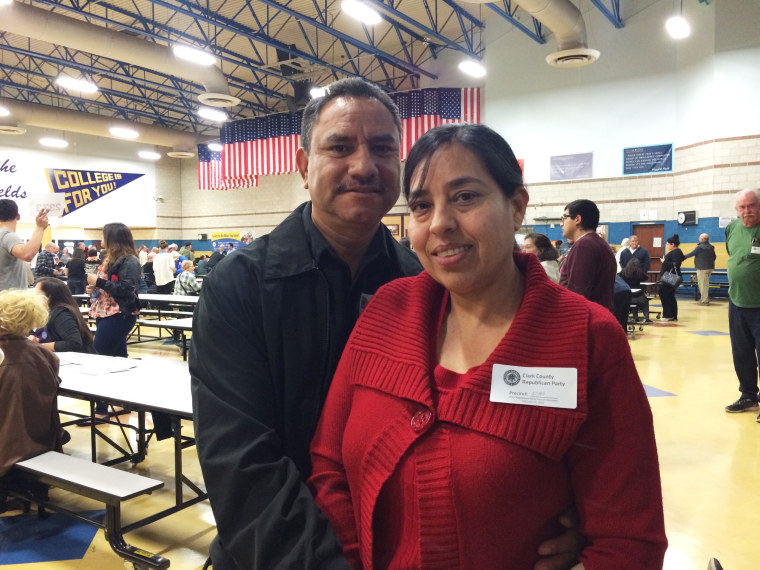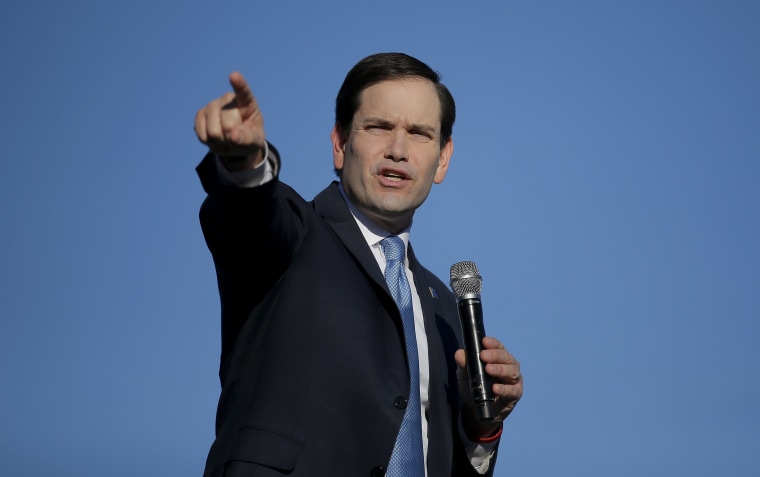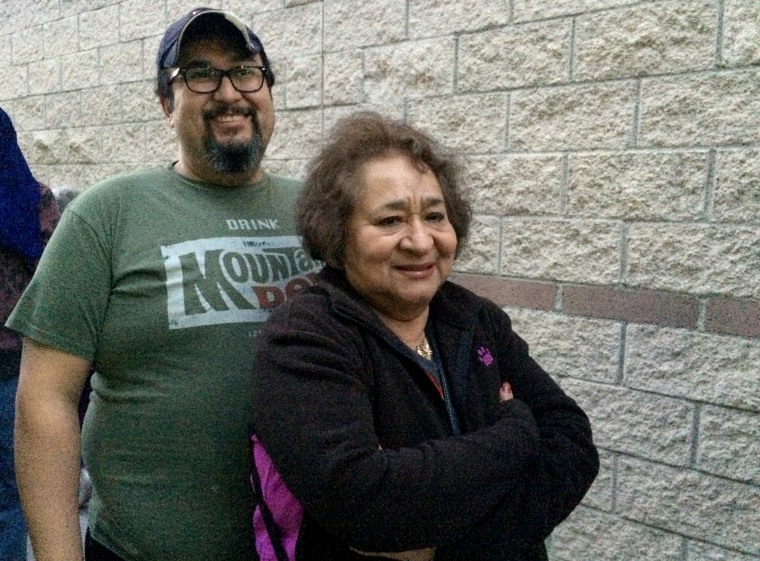LAS VEGAS -- Latinos participating in the Republican caucus Tuesday went to their precinct sites amid growing realization that Donald Trump could be the GOP’s nominee and as two Hispanics on the ballot, Ted Cruz and Marco Rubio engaged in a bitter battle for at least second place.
Trump won the "First in the West" caucus. He had the highest share of Hispanics, but a majority of Latinos surveyed in entrance polls voted for candidates other than Trump. About 9 percent of those who participated in the caucus were Hispanic, according to the the poll.
RELATED: Donald Trump Wins Big in Nevada As Super Tuesday Looms
"You know what I really am happy about? Forty-six percent with the Hispanics. Forty-six percent! No. 1 with Hispanics. I'm really happy about that," Trump said in his victory speech.
He repeated that Mexico would pay for the wall he wants to build on the southern border. "I'll talk to them and they'll pay for it," Trump said. "They are going to be thrilled."
At Cheyenne High School in north Las Vegas, the caucus scene in a high school cafeteria was reminiscent of a bingo hall, which seemed appropriate for the city of gaming. Amid a din of chatter, Jesús Marquez, a Republican analyst who oversaw the caucus event, shouted out precinct numbers in a microphone.

In response, volunteers held up a sheet of paper with the number, but sometimes they blended with all the other numbers on paper that were raised. Marquez would point to the correct precinct to help guide voters to their voting place.
Reporters who had asked Republican party officials for precincts with higher numbers of Latino voters were directed to the multi-precinct caucus site where a sprinkling of Hispanic voters could be found.
Anastacio Torres, 73, who moved around on a chair walker, wore a pin and carried a sign for his choice, Marco Rubio. Torres said his roots go back to the Spaniards who founded New Mexico, where he was born. He'd been following Rubio since he was in the Florida Senate. "He's got quite a reputation and I'd just like to see his candidacy advance and he has probably has the greatest chance of being the president of the United States that's Hispanic," Torres said.
RELATED: Nevada's Latinos Ready to Caucus Amid High GOP Stakes
Rubio has become the candidate of choice for several former supporters of Jeb Bush who ended his campaign after a poor finish in South Carolina. Rubio was in Michigan while results were being counted in Nevada.
José García, 44, also was among those in the bigger than expected crowd. He had moved from Colorado to Nevada after losing his job and said he had been working six years in part-time jobs and been unable to find full time work.

"I'm tired of the last seven years of social progress, social programs, putting the emphasis on that rather than jobs," said García, who had been a director of business for a mental health center in Colorado.
"It's a skewed way of life right now. I just don't see the economy moving anywhere but down. We are in another recession and nobody seems to say that," García said. Although he wouldn't say who would get his vote, García said having a multi-candidate field was "the way it should be ... It's better. Because I feel like everyone here is represented rather than have one or two options."
Rafael Mundo, 49, a pastor at Iglesia Hispana "The Hills" and his wife Martha Mundo, 48, cast their vote for Ted Cruz on their first time to caucus. Morals was the reason they chose Cruz, they said. Both immigrants from Mexico, they conceded immigration is important, but morality was a bigger issue.
"I was expecting to vote for Ben Carson, but he was very low," Mundo said. Martha Mundo said she also liked Rubio.
Even though he voted so as to serve as an example to his congregation, Mundo noted the lack of a large number of Latinos at the voting site.
"I believe Republicans, they need to do something for Hispanics because it is time. Hispanics need to understand it is a big voice," said the pastor.
Before the Nevada caucus, Trump had been winning 35 percent of the Republican vote. The question after the caucus was how many candidates would drop out after Nevada.
Márquez, a Rubio backer, said going into the Super Tuesday primaries with the party still divided among three candidates means “Donald Trump may win.”

But he said a second place finish for Rubio would make him "well positioned" to the crucial elections next Tuesday. "This just shows he has momentum to rise and go into Super Tuesday," Marquez said.
The Nevada GOP reported 37,000 registrations to participate in the caucus, up from the 2012 actual participation, which was almost 33,000. Nevada only began holding an early caucus in 2008 and has some 430,000 registered Republicans in the state.
Monica Johnson, 33, took the time to learn about the caucus in a training session the Nevada GOP held last week for Hispanics in English and Spanish.
Having become a citizen three years ago, she said going to caucus for the first time would be a “very celebratory time for me.”
“Being part of the American Dream means being part of the American process,” said Johnson, who has a master’s in U.S. history. “It’s the first time I’ve been able to be a ‘part of’ and I think as more people make their home here, I think it’s their duty to do so.”
Johnson, originally from Guatemala City, Guatemala, has been in the U.S. 30 years, but said the cost of becoming a citizen, pursuing her doctorate and being preoccupied with children kept her from doing the work to become a citizen.
A business owner, Johnson was still researching candidates and deciding whom she could support at the time of the caucus training. She said Trump was not one of her favorites. But rather than be turned off by the rhetoric, she saw her participation in the caucus as going beyond just having a say on who becomes the party’s presidential nominee.

“I think the image of the Hispanic presence here, it has evolved and now is an unprecedented time. We are changing the demographics of not just Las Vegas but nationwide,” she said.
"We are starting to realize we can not only make it here, but be in a place where we can be agents of change in this political arena. So I think it’s important we change that image by becoming more informed, and I think that in itself will inform political leaders that our voice needs to be heard,” said Johnson.
